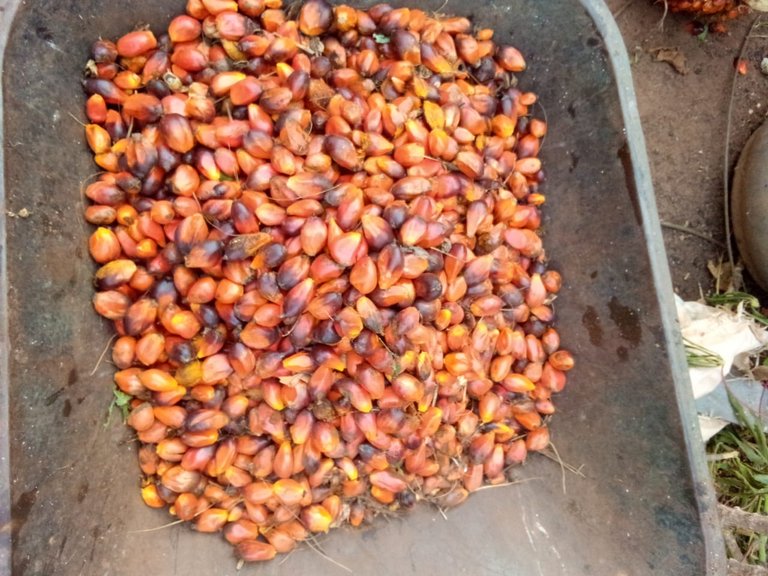Good morning my good people of hive community, i hope you all enjoyed your rest. I am here this morning to write on the Economic value of palmfruits.

Palm fruits, harvested from the oil palm tree (Elaeis guineensis), are not only a staple in various cuisines worldwide but also hold significant economic value across multiple industries. From palm oil production to cosmetics and biofuel, the economic significance of palm fruits cannot be overstated. Let's delve into the diverse avenues where palm fruits contribute to the global economy.

1. Palm Oil Production:
Palm oil, extracted from the flesh of palm fruits, is the most widely used vegetable oil globally. Its versatility in cooking, food processing, and industrial applications makes it indispensable. Palm oil serves as a key ingredient in products ranging from cooking oil and margarine to baked goods and processed foods. Its high yield per hectare compared to other oil crops makes it a cost-effective choice for producers, thus driving its economic value.
2. Biofuel Production:
With growing concerns over fossil fuel dependency and environmental sustainability, palm oil has emerged as a viable feedstock for biofuel production. Biofuels derived from palm oil, such as biodiesel, offer a renewable alternative to traditional fossil fuels. The demand for biofuels continues to rise, driven by government mandates for renewable energy sources and increasing environmental consciousness. This trend further enhances the economic significance of palm fruits.

3. Cosmetic and Personal Care Industry:
Palm oil and its derivatives are prevalent in the cosmetic and personal care industry. They are utilized in a wide array of products, including soaps, shampoos, moisturizers, and cosmetics. Palm oil's unique properties make it an ideal ingredient for skincare formulations, providing moisturizing and emollient effects. The cosmetic industry's reliance on palm oil underscores its economic value and contribution to the global market.

4. Livestock Feed:
Palm kernel meal, a byproduct of palm oil extraction, serves as a valuable source of protein and energy in livestock feed. Its inclusion in animal feed formulations helps meet the nutritional requirements of livestock, particularly in regions where traditional protein sources may be scarce or expensive. As the demand for animal protein continues to grow worldwide, the economic importance of palm kernel meal as a feed ingredient remains significant.
5. Employment and Livelihoods:
The cultivation and processing of palm fruits provide employment and livelihood opportunities for millions of people, particularly in tropical regions where oil palm plantations are prevalent. From smallholder farmers to plantation workers and processing facility employees, the palm oil industry supports a vast network of individuals and communities. The economic ripple effects extend beyond direct employment, benefiting ancillary industries and local economies.
6. Sustainable Practices and Certification:
Amid concerns about deforestation, habitat destruction, and social issues associated with palm oil production, there is a growing emphasis on sustainable practices and certification schemes. Initiatives such as the Roundtable on Sustainable Palm Oil (RSPO) aim to promote environmentally and socially responsible palm oil production. Adherence to sustainability standards not only mitigates environmental impact but also enhances market access and consumer trust, thereby safeguarding the long-term economic value of palm fruits.
Conclusion:
The economic value of palm fruits extends far beyond their culinary uses. From palm oil production and biofuel to cosmetics, livestock feed, and employment generation, palm fruits play a pivotal role in various industries and livelihoods worldwide. As global demand continues to rise, sustainable practices and responsible management are imperative to ensure the enduring economic prosperity of this versatile crop.
Thank you for stopping by to read my article, i hope you enjoyed it.